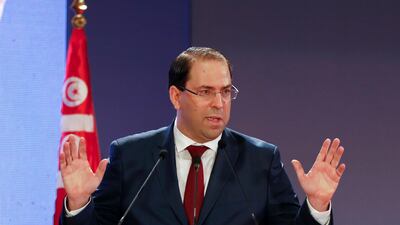Tunisia's ruling Nidaa Tounes party said on Friday that it had frozen the prime minister's membership in the latest escalation in a row between the prime minister and the president's son.
Prime Minister Youssef Chahed said in May that the president's son, Hafedh Caid Essebsi, had destroyed the ruling Nidaa Tounes party and that the crisis in the party has affected state institutions.
"The party decided to freeze the membership of Chahed", Nidaa Tounes said in a statement.
The president's son, who is the leader of Nidaa Tounes, had called for the prime minister's dismissal because of his government's failure to revive the economy. His call was supported by the powerful UGTT union, which rejected economic reforms proposed by the prime minister.
______________
Read more:
Tunisia’s economy starts to rebound but structural issues persist – IMF
Unemployed Tunisians turn to illegal Mediterranean crossings to Europe
Tunisia's plans for inheritance equality divide nation
______________
But the moderate Islamist party Ennahda rejected calls to dismiss Mr Chahed and said the exit of the prime minister would hit stability at a time when the country needed economic reforms.
"Despite the lack of political support for the government, we will move ahead with economic reforms next year, including the reform of subsidies and social funds," Mr Chahed said on Friday.
In July, president Beji Caid Essebsi called on Mr Chahed to step down or seek a confidence vote if the country’s political and economic crisis continued, withdrawing his support for the premier.
The North African country has been hailed as the Arab Spring's only democratic success after protests toppled autocrat Zine El Abidine Ben Ali in 2011 without triggering the kind of violent upheavals seen in Syria and Libya.
But since 2011, nine cabinets have failed to resolve Tunisia's economic problems, which include high inflation and unemployment. Impatience is rising among lenders such as the International Monetary Fund, which has kept the country afloat.

